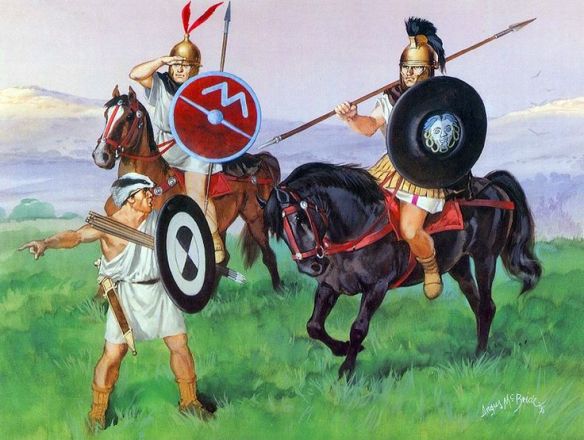
“Cavalrymen and Veles. Thessaly, Second Macedonian War, 200-197 BC”, Angus McBride
Macedonia and the Aegean world c.200 B.C.
A series of wars during which the Romans gained control over Greece and destroyed the Macedonian kingdom.
The First Macedonian War (215-205 B. C. E.)
In 215 B. C. E. the Macedonian king Philip V signed a treaty with the Carthaginian general Hannibal, who had invaded Italy. Thereupon Philip invaded Rome’s possessions in Illyria (Albania). Although the Romans succeeded in keeping the important city of Apollonia out of Philip’s hands, the war effort in Italy prevented them from intervening until 211 B. C. E., when the Romans allied with the Greek confederacy of Aetolia.
The Romans left land warfare to the Greeks, confining themselves largely to naval support. In the following years, Rome’s successes were mainly diplomatic. Several Greek states chose Rome’s side. Philip was driven out of Greece by diplomatic means. Then, during a lightning campaign, Philip defeated the Greeks and their Balkan tribal allies, recovered his position in Greece, and attacked Aetolia. The Aeolians sued for peace (206 B. C. E.) after their Spartan allies were defeated by the Achaeans. After an unsuccessful campaign in Illyria, the Romans did so as well. The Peace of Phoenice (205 B. C. E.) left Philip in possession of his conquests in Illyria.
The Second Macedonian War (200-197 B. C. E.)
In 200 B. C. E., war broke out again. The Romans landed in Illyria with two legions and marched inland. They failed to push through into Macedonia but did succeed in coercing several states to join the many Greek states that had already joined them.
In 199 B. C. E., an army of Greek allies raided Thessaly and southern Macedonia, but during a lightning campaign, Philip succeeded in fighting off both these invaders and Rome’s tribal allies on the Balkan frontier. In the following year, Philip took the initiative and moved his army into a strategic position, where he threatened the lines of communication of the Roman army in Illyria. The Romans assaulted Philip’s position, a costly but eventually successful campaign. Thereupon Philip retreated into Macedonia. In the meantime, the allies of Rome were successful at sea, and even more Greek states joined the Romans.
Philip advanced into Thessaly but was engaged by the Roman army before he had reached his objective. He was forced to do battle at Cynoscephalae and was defeated. He had to abandon all territories outside Macedonia and respect the independence of all Greek cities. The Romans assumed Macedonia’s role of dominant power in Greece.
The Third Macedonian War (171-168 B. C. E.)
The Romans felt threatened in their hegemony when King Perseus, the son of Philip V, again started to acquire influence in Greece. Unscrupulously taking advantage of Perseus’s diplomatic advances to avoid hostilities, they brought an army into Illyria and Greece. Perseus reacted with speed and outmaneuvered the Romans in Thessaly, cutting off their line of supplies.
In the meantime, the Romans alienated themselves from the Greeks by their brutality, heavy-handedness, and greed. Perseus, on the contrary, became increasingly popular. Moreover, he was successful, while the Romans suffered from bad discipline and command. Two invasions of Macedonia failed, and Perseus counterattacked, regaining territory and defeating Rome’s Balkan tribal allies. During the following winter (169 B. C. E.), he campaigned successfully against the Romans on Macedonia’s northwestern frontier and in Greece and Epirus.
In 168 B. C. E., the consul Lucius Aemilius Paullus assumed command of the Roman army. The Romans decided to attack on three fronts: a naval offensive in the Aegean Sea, an offensive from the west from Illyria, and an offensive from Thessaly. After initial Macedonian success, Perseus met the Romans at Pydna. The well-deployed Macedonian phalanx attacked the unprepared Romans, but the Macedonian line became disrupted. The Romans counterattacked and broke the Macedonians. Perseus was captured and brought to Italy. Macedonia was divided into four republics, tributary to Rome.
The Fourth Macedonian War (146 B. C. E.)
The so-called Fourth Macedonian War was in fact an insurrection. The Macedonians had always been very loyal to their royal house, and in 152 B. C. E., a pretender to the throne named Andriscus aroused the Macedonians into a rebellion to reinstate the royal dynasty. The insurgents initially succeeded in defeating an army consisting of a Roman legion and local militia, though another Roman army soon crushed the revolt.
References and further reading: Errington, Robert Malcom. A History of Macedonia. Berkeley: University of California Press, 1990. Hammond, Nicholas Geoffrey Lem Priere, and F. W. Walbank. A History of Macedonia. Vol. 3, 336-167 B. C. E. Oxford: Clarendon Press, 1988. Walbank, Frank William. Philip V of Macedon. Cambridge, UK: Cambridge University Press, 1940. Reprint, Hamden, CT: Archon Books, 1967.